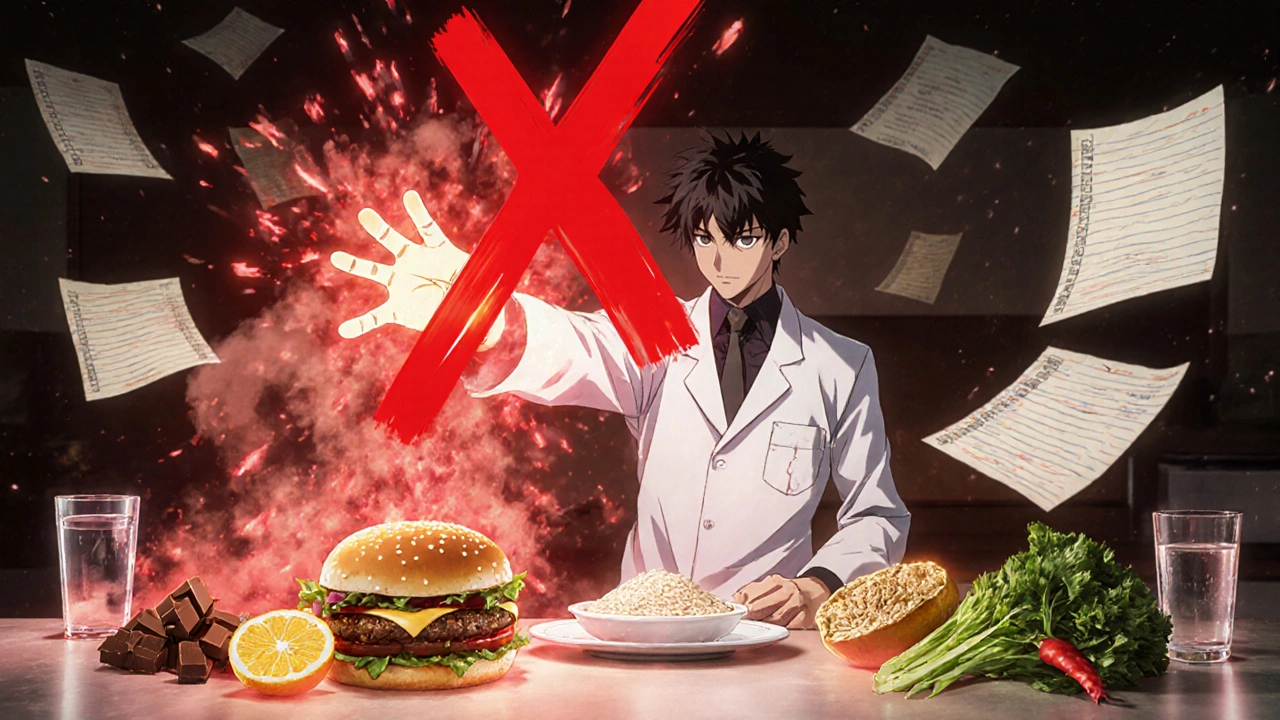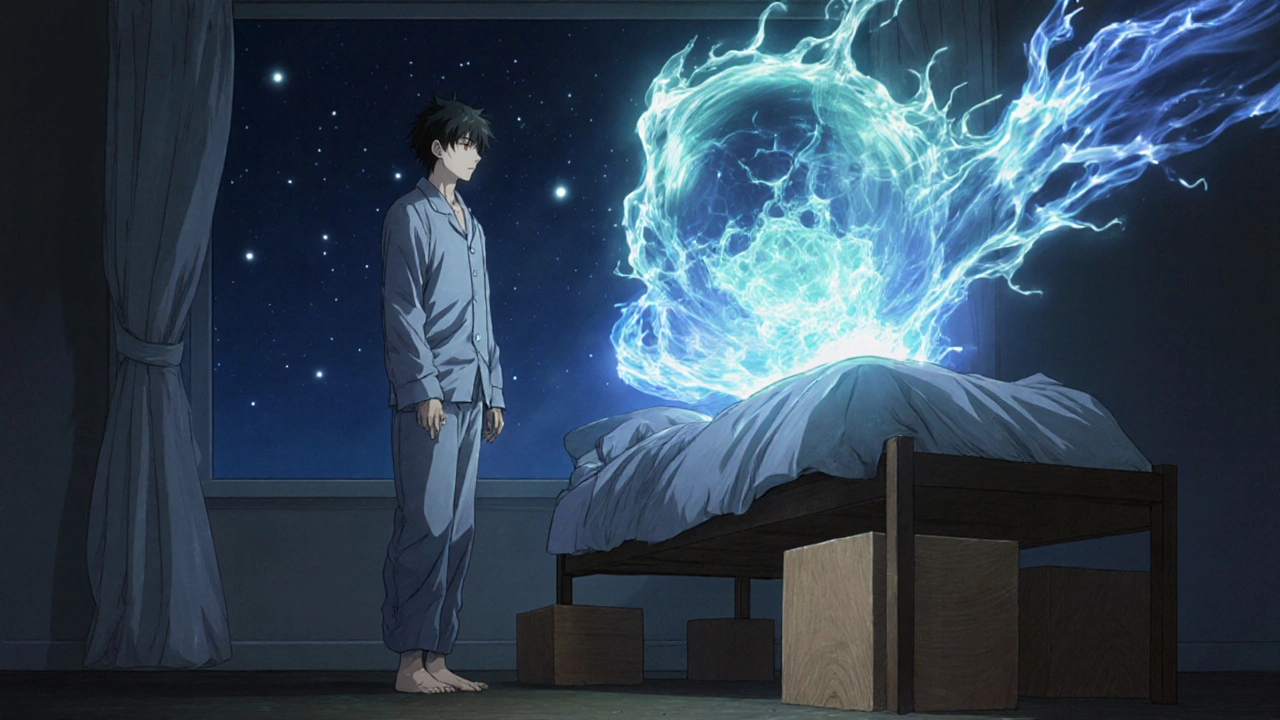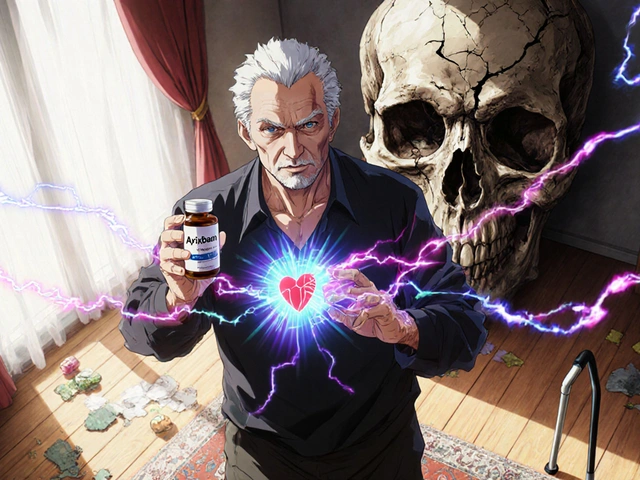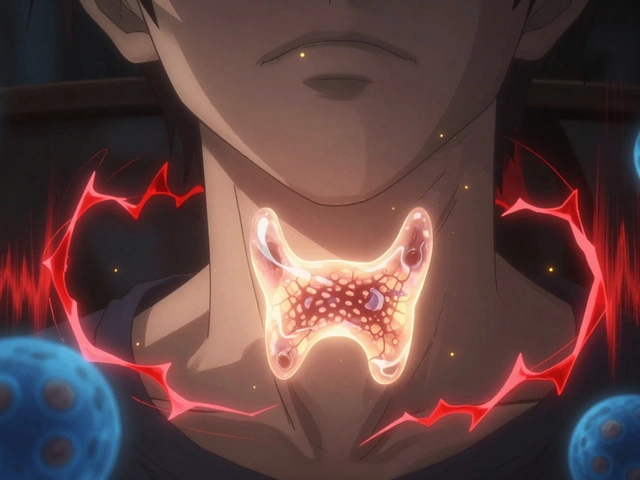What Is GERD, and Why Does It Keep Coming Back?
GERD isn’t just occasional heartburn. It’s when stomach acid keeps flowing back into your esophagus-often enough to cause burning, pain, or even damage to the lining. About 1 in 5 people in the U.S. deal with this daily. If you’re getting symptoms more than twice a week, or if you’re waking up at night with a sour taste in your mouth, you’re not just "having a bad night." You likely have gastroesophageal reflux disease.
The esophagus isn’t designed to handle stomach acid. Over time, that constant exposure can lead to inflammation, ulcers, or worse-Barrett’s esophagus, a condition that slightly raises your risk of esophageal cancer. The good news? Most people can get control of it without surgery. But it takes more than popping an antacid. You need a real plan.
Stage One: Fix Your Habits Before You Reach for Pills
Before you buy your next bottle of omeprazole, try changing what you do every day. Lifestyle changes work. In fact, 7 out of 10 people see big improvements just by adjusting their routine.
- Elevate your head while sleeping. Don’t just stack pillows. Use blocks under the bedposts to raise the head of your bed by 6 inches. Gravity keeps acid where it belongs.
- Wait three hours after eating before lying down. Lying down too soon after a meal increases reflux by 50%. If you eat dinner at 7 p.m., don’t get into bed until at least 10 p.m.
- Loosen your belt. Tight clothes around your waist squeeze your stomach, pushing acid upward. Even a few inches of extra space helps.
- Quit smoking. Smoking weakens the muscle that blocks acid from rising. One cigarette can drop that muscle’s pressure by 30-40%. It’s not just about lung health-it’s about your esophagus too.
- Limit alcohol. Beer, wine, and liquor relax the same muscle. Stick to under two drinks a day. One glass of red wine might be fine. Three? Not so much.
- Lose weight if you need to. Losing just 10% of your body weight can cut GERD symptoms by 40%. That’s not a miracle-it’s physics. Less belly fat means less pressure on your stomach.
What Foods Trigger GERD? (It’s Not Just Spicy)
Everyone knows spicy food causes heartburn. But that’s only part of the story. The real triggers are often hidden in meals you think are harmless.
- Coffee and tea. Caffeine increases stomach acid by 23% within 30 minutes. Even decaf can be a problem-some compounds in coffee irritate the esophagus directly.
- Chocolate. It’s not just sugar. Chocolate contains methylxanthine, which relaxes the lower esophageal sphincter. A single piece can be enough to start reflux.
- Fatty foods. Fried chicken, cheeseburgers, creamy pasta-anything over 30 grams of fat per meal delays stomach emptying. That means acid sits longer, and has more time to escape.
- Citrus and tomatoes. Oranges, lemons, grapefruit, tomato sauce, salsa-they’re acidic. Their pH is low enough to burn your esophagus directly, even without extra acid.
- Carbonated drinks. Soda and sparkling water puff up your stomach, increasing pressure. That pressure forces acid upward. Try still water instead.
- Peppermint. Yes, even mint tea. It relaxes the sphincter muscle. That’s why it’s good for digestion-but bad for GERD.
Not everyone reacts the same way. Keep a food diary for two weeks. Write down everything you eat and when symptoms hit. You might find you’re fine with tomatoes but wrecked by onions. Or you can eat chocolate but not garlic. Personal triggers matter more than general lists.

Medications: From Antacids to the Newest Drugs
When lifestyle changes aren’t enough, meds step in. But not all are created equal-and timing matters.
Antacids (Tums, Rolaids) work fast but don’t last. They neutralize acid right away, giving relief in minutes. But the effect fades after an hour. Great for a quick fix after a big meal, but not for daily use.
H2 blockers (Pepcid, Zantac) reduce acid production. They kick in within an hour and last 10-12 hours. Good for mild symptoms or if you know you’ll eat something risky. Take them 30-60 minutes before eating for best results.
PPIs (Nexium, Prilosec, Protonix) are the go-to for moderate to severe GERD. They block acid production at the source. You’ll feel better in a few days, but full effect takes 2-5 days. Take them before your first meal of the day. If you take them after eating, they won’t work as well. About 85% of people with esophagitis heal within 8 weeks on PPIs.
But long-term use? That’s where things get tricky. Using PPIs for over a year raises your risk of pneumonia, C. diff infection, kidney issues, and low magnesium. The FDA warns about this. If you’ve been on them for years, talk to your doctor about tapering off.
Voquezna (vonoprazan) is the newest option. Approved in late 2023, it works faster and stronger than PPIs. It keeps your stomach pH above 4 for nearly the whole day-something PPIs struggle with at night. If you still have nighttime heartburn on PPIs, Voquezna might be your answer. It’s not cheap, but it’s changing how we treat stubborn GERD.
Surgery: When Pills Aren’t Enough
If you’ve tried everything and still can’t breathe after eating, or you’re tired of popping pills every day, surgery might be the right next step.
Laparoscopic Nissen fundoplication is the gold standard. The surgeon wraps the top of your stomach around the lower esophagus to reinforce the barrier. Success rate? 90-95% at five years. But 1 in 5 people end up with bloating or trouble burping. Some can’t eat big meals anymore.
LINX device is a small ring of magnetic beads implanted around the esophagus. It lets food pass down but snaps shut to stop acid from rising. It’s less invasive than fundoplication. After five years, 85% of patients don’t need daily PPIs anymore. But you can’t get an MRI with it. And if you’ve had prior stomach surgery, it’s not an option.
TIF (Transoral Incisionless Fundoplication) is done through your mouth-no cuts. It rebuilds the valve from the inside. Success is around 70-75% after three years. Only about 127 doctors in the U.S. are trained to do it. It’s not for everyone, but for some, it’s a game-changer.

What Works Best? Real Stories From Real People
Reddit’s r/GERD community has over 140,000 members. Scroll through and you’ll see patterns.
One user, u/HeartburnWarrior, cut fat to under 20 grams a day and raised their bed. No meds. No surgery. Symptoms vanished.
Another, u/AcidRefluxSufferer, took PPIs for five years. Then they stopped working. They got the LINX device. Two years later, still symptom-free.
On Amazon, 12% of people who reviewed omeprazole said they got vitamin B12 deficiency. That’s real. Long-term acid suppression can interfere with nutrient absorption.
Trustpilot reviews for LINX show 78% positive. But 22% still struggle with swallowing pills or bloating. Surgery isn’t a magic fix-it’s a trade-off.
How to Stay in Control Long-Term
GERD isn’t cured. It’s managed. And management means daily awareness.
- Track your food and symptoms. Use a simple app or notebook. You’ll spot patterns no doctor can guess.
- Don’t skip your PPI dose. Take it 30-60 minutes before breakfast. Timing makes the difference between control and breakthrough reflux.
- Try diaphragmatic breathing. Breathe deeply into your belly for 15 minutes after meals. It reduces pressure on your stomach. Studies show a 35% drop in symptoms. Most people quit after a week. But if you stick with it, it helps.
- Get checked if you’ve been on PPIs for over a year. Ask your doctor for a magnesium blood test. Low levels can cause muscle cramps, fatigue, and irregular heartbeat.
What’s Coming Next?
The GERD market is growing fast-projected to hit nearly $10 billion by 2028. Why? Obesity rates are climbing. More people over 65. And we’re learning more about non-acid reflux-where the problem isn’t acid at all, but nerve sensitivity. That’s changing how we treat people who don’t respond to PPIs.
New guidelines are coming in late 2025. They’ll likely push for earlier use of P-CABs like Voquezna and more personalized diet plans. The future isn’t just more pills. It’s smarter, tailored care.
Can GERD go away without medication?
Yes, for many people. Lifestyle changes-losing weight, avoiding trigger foods, not lying down after meals, and elevating the head of the bed-can eliminate symptoms entirely. About 70% of people see major improvement with these steps alone. But if you have esophagitis or Barrett’s esophagus, medication is usually needed to heal the tissue.
Is it safe to take PPIs for years?
Long-term PPI use (over a year) is linked to higher risks of pneumonia, C. diff infection, kidney disease, and low magnesium. The FDA recommends periodic review of your need for these drugs. If you’ve been on them for years, talk to your doctor about whether you can reduce the dose or switch to an H2 blocker. Never stop cold turkey-rebound acid can make symptoms worse.
What’s the difference between GERD and occasional heartburn?
Occasional heartburn happens to almost everyone after a big meal or spicy food. GERD is diagnosed when it happens more than twice a week, or when it causes damage to the esophagus. If you’re using antacids more than twice a week, or waking up with acid in your throat, you likely have GERD-not just bad digestion.
Does stress make GERD worse?
Stress doesn’t cause GERD, but it can make symptoms feel worse. When you’re stressed, your body becomes more sensitive to pain. That means the same amount of acid feels more burning. Stress can also lead to poor eating habits-late meals, junk food, skipping meals-which trigger reflux. Managing stress with breathing, sleep, or therapy can help reduce symptom severity.
Can I drink alcohol with GERD?
Alcohol relaxes the lower esophageal sphincter and increases acid production. Even small amounts can trigger reflux. If you drink, limit it to one drink occasionally-and never right before bed. Red wine might be less irritating than beer or spirits, but no alcohol is truly safe for GERD. If you notice symptoms after drinking, it’s best to avoid it.
Is LINX surgery worth it?
For people who are tired of daily medication and have confirmed acid reflux, LINX can be life-changing. Eighty-five percent of patients stop needing PPIs after five years. But it’s not for everyone. You can’t have an MRI after implantation. Some people still get bloating or trouble swallowing. Talk to a surgeon who does at least 20 procedures a year. Results are best with experienced teams.
What’s the best time to take a PPI?
Take it 30-60 minutes before your first meal of the day. PPIs work by blocking acid-producing cells in your stomach. Those cells are most active when you eat. Taking the pill before breakfast ensures it’s active when your stomach starts working. Taking it after eating means it won’t work as well.





Loved this post! 🙌 Seriously, who knew chocolate was a GERD villain? I thought it was just my spicy tacos. Now I know why my midnight Snickers turned me into a human volcano. 🍫🔥 Also, elevating the bed? Genius. I used to stack pillows like a toddler building a fort. Now I’ve got cinder blocks under my frame. Sleep like a king. Or at least like someone who doesn’t wake up tasting their dinner.
I appreciate the breakdown but honestly? You skipped the real issue - gut microbiome. GERD isn’t just acid, it’s dysbiosis. Most people don’t realize that low stomach acid can cause reflux too. Yeah, I said it. Your body’s not making enough acid, so your stomach delays emptying, pressure builds, and boom - acid backs up. PPIs make it worse long-term. Try HCl supplements with pepsin. Also, chew your food 30 times per bite. It’s not magic, it’s biology.
PPIs are a government conspiracy. They’re pushing these drugs because Big Pharma owns the FDA. Did you know the FDA banned H2 blockers in 2019? No? Because they didn’t. But they will. Mark my words. And that LINX device? It’s got a microchip. They’re tracking your reflux patterns. I saw a guy on YouTube with a LINX implant who got a text from his phone saying "Your esophagus is inflamed. Take a PPI." I’m not joking. The NSA is using GERD patients as test subjects. I’ve stopped all meds. Now I just drink apple cider vinegar and scream into a pillow. Works better than anything.
I think what’s missing here is the philosophical angle. GERD is just a symptom of modern disconnection. We eat fast. We lie down fast. We stress fast. We forget that our bodies evolved to move after meals. We used to walk after dinner. Now we collapse on the couch and scroll TikTok while our stomachs scream for mercy. The real cure isn’t a pill or a magnetic ring. It’s presence. It’s slowing down. It’s remembering that food is not fuel. It’s communion. And when we treat it like a commodity, our bodies rebel. Not with anger. With acid.
I’ve read this entire thing. And I have to say - the science here is solid. But I’m concerned about the lack of data on long-term surgical outcomes. The LINX device? 85% success rate? That’s not a statistic - that’s a marketing slogan. The FDA doesn’t track these devices beyond five years. And the TIF procedure? Only 127 doctors in the U.S.? That’s not accessibility - that’s elitism. We need universal access to GERD care - not just for the wealthy who can afford $30k implants. This isn’t a luxury. It’s a public health crisis.
I’m from the Philippines and I just want to say - this post saved my life. Back home, people think GERD is just "stomach heat" and drink coconut water and pray. I tried everything - ginger tea, papaya, fasting - nothing worked. Then I found this. I stopped coffee. I raised my bed. I started breathing into my belly after meals. Three months later - no burning. No pills. I cried. I really cried. Thank you for writing this like a human, not a robot. I’m sharing it with my whole family. Even my tita who eats 3 fried chicken pieces for breakfast.
I’ve been on PPIs for 7 years. I stopped cold turkey because I read a blog that said it causes cancer. I got worse. Like, screaming-in-the-shower worse. I went to the ER. They gave me a $1200 bill and told me to go back on it. Now I’m on Voquezna. It’s expensive. My insurance hates me. But I can sleep. I can eat a burger. I can live. I’m not a statistic. I’m a person who just wants to not feel like my throat is on fire. So yeah. I’m mad. And I’m not sorry.
I’ve been a nurse for 18 years. I’ve seen people on PPIs for decades. I’ve seen the bone density loss. The B12 deficiencies. The kidney damage. But I’ve also seen people who got off meds and lived symptom-free. The truth? It’s not either/or. It’s both. You need the meds to heal the damage. And you need the lifestyle changes to stay off them. Don’t shame the person who needs a pill. Don’t glorify the person who "went natural." We’re all just trying not to burn alive. And if you’re reading this and you’re scared? You’re not alone. I’ve been there. Breathe. Start with one change. Maybe just sleep with your head up. That’s enough for today.
They’re hiding the truth. The real cause of GERD? 5G towers. They interfere with your vagus nerve. That’s why it’s worse at night. That’s why it’s spreading. That’s why the FDA won’t talk about it. I live in a rural area. No cell towers nearby. My GERD vanished for 11 months. Then my neighbor got a new router. Boom. Back to square one. I’ve wrapped my bed in aluminum foil. It helps. Sort of. I also wear a Faraday hat. I know it looks crazy. But I’m not crazy. I’m just informed.
You’re all missing the point. This isn’t about food or pills. It’s about control. People with GERD are weak. They let their bodies rule them. They eat junk. They don’t exercise. They sleep like sloths. I’ve never had GERD. Why? Because I don’t indulge. I don’t drink. I don’t eat carbs after 6. I do 100 push-ups a day. I don’t need a blog to tell me how to live. You’re all just looking for an excuse to be lazy. Fix your life. Or keep taking pills. Either way - you’re not a victim. You’re a choice.
I tried everything. Then I just stopped eating after 7 p.m. And raised my bed. That’s it. No meds. No surgery. No supplements. I’m not a hero. I just listened. And now I sleep. 💤